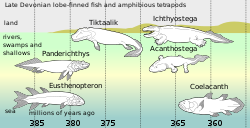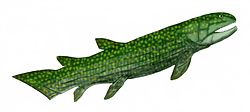Tetrapodomorph
Tetrapodomorpha is a clade of vertebrates. It is a subclass of the Sarcopterygii which includes tetrapods (four-limbed vertebrates) and their more fish like relatives.
| Tetrapodomorphs Temporal range: early Devonian-Recent
| |
|---|---|

| |
| The basal tetrapodomorph Tiktaalik | |
| Scientific classification | |
| Kingdom: | Animalia |
| Phylum: | Chordata |
| Clade: | Rhipidistia |
| Clade: | Tetrapodomorpha |
Advanced transitional fossils between fish and the early labyrinthodonts, like Tiktaalik, are informally called 'fishapods' by their discoverers. They are half-fish half-tetrapods, in appearance and limb morphology.
Tetrapodomorpha contains
- the stem group tetrapoda, extinct fossil relatives of the crown group. This is a paraphyletic unit covering the fish to tetrapod transition. Tetrapodomorpha contains several groups of related lobe-finned fishes, collectively known as the osteolepiforms.
- the crown group tetrapods, the last common ancestor of living tetrapods and all of its descendants.
Among the characters defining tetrapodomorphs are modifications to the fins, notably a humerus with convex head articulating with the glenoid fossa (the socket of the shoulder joint).
Tetrapodomorph fossils are known from the early Devonian onwards, and include Eusthenopteron, Osteolepis, Panderichthys, Tiktaalik, Ventastega and Kenichthys.
The fossils of the early Mississippian, Pederpes and Whatcheeria are regarded as early tetrapods whose relationships are not yet clear.
Related pages
Tetrapodomorph Media
In Late Devonian vertebrate speciation, descendants of pelagic lobe-finned fish.








